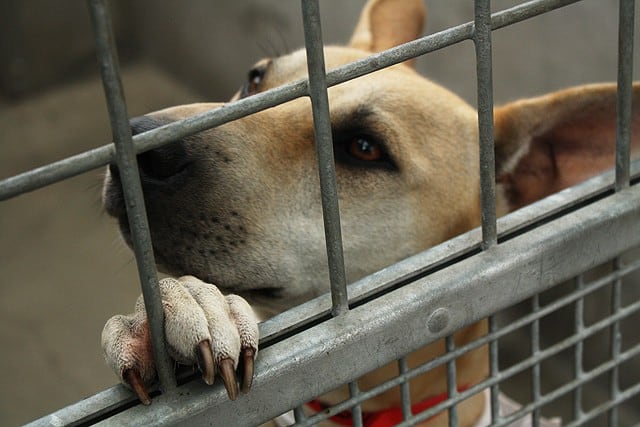Reproductive Problems in Dogs. Male and female dogs are sexually mature and can reproduce between the ages of six and nine months. Female dogs generally go through an estrus or heat cycle every six months, in the spring and fall. A blood tinged vaginal discharge lasts for seven to ten days and precedes estrus or true heat. The vaginal discharge changes from red to yellowish in color during true heat. At this stage, females are receptive to males and may be successfully bred. Some females also become short-tempered and anxious. Surgical neutering of female dogs is also called a “spay”. It eliminates all heat cycles, bleeding and personality changes.
PYOMETRA
Pyometra, which literally means “pus in the uterus”, is a potentially life-threatening infection of the uterus that occurs in female dogs over five years old that are not spayed. The cause is a combination of hormonal and bacterial factors that lead to severe, life threatening bacterial infection of the uterus. These bacteria are called E-coli and come from the feces. They migrate from the feces up through the vulva into the uterus and multiply there slowly for several years. Eventually the bacteria cause severe infection, the uterus fills with pus and the dog becomes quite sick.
There are two types of pyometra, depending on whether the cervix, which is the opening to the uterus, is open or closed. Open pyometra occurs during or just after the heat cycle when the cervix is still open. Since the cervix is open, the pus, along with the blood-tinged or clear-colored vaginal fluid, exits through the vulva. Owners usually see or smell the foul vaginal discharge. These dogs just don’t feel well. Signs include lethargy, a mild fever, and increased thirst, some vomit. Closed pyometra occurs one to three months after the heat cycle, when the dog’s cervix is closed. Pus cannot drain out of the body, so it stays in the uterus. Some of the bacteria from the uterus reenter the bloodstream. This can lead to a blood infection, which is called septicemia, and can quickly be fatal. Signs are those of a very sick “Toxic” dog and include a high fever, weakness, a lack of appetite and vomiting.
WARNING
In male dogs, be sure both testicles have descended down into the scrotum by the time they are six months old. Testicles retained in the abdomen can develop into an aggressive life threatening type of cancer called a Sertoll cell tumor.
Small breeds like Yorkshire terriers are prone. Retained testicles are considered to be a major genetic defect. These dogs should be neutered which eliminates the risk of cancer and prevents transmission to offspring.
WHAT YOUR VET CAN DO
* The treatment of choice for pyometra is to surgically remove the infected uterus. An emergency spay is lifesaving. A spay is actually an ovarian hysterectomy and involves surgical removal of the ovaries, uterus and fallopian tubes. Pyometra cases with a closed cervix are very sick; many are in shock, dehydrated and have concurrent kidney failure. Vets often must decide whether the treatment or the disease is the most life threatening. Once pyometra occurs, it tends to recur, so most dogs with pyometra are spayed.
* Extremely valuable breeding bitches with the open cervix type of pyometra may opt for medical treatment which involves using a hormone called Prostaglandin F2 Alpha. This hormone causes the uterus to contract and expel the pus. The dog’s life is saved and she is still able to be bred.
* Neutering dogs is an important part of responsible pet ownership. It helps reduce overpopulation and decreases the number of unwanted dogs that end up in shelters or are euthanized by vets. Spaying (the term for neutering a female dog) involves removal of the entire reproductive tract.
Spaying before the first heat cycle at five to six months of age dramatically decreases the risk of mammary and uterine cancer and eliminates the risk of pyometra.
* In male dogs neutering involves an orchiectomy, which is the surgical removal of both testicles. The risk of testicular cancer is virtually eliminated. Neutering also decreases urine odor and territorial urine marking. Neutered male dogs are less likely to roam and are generally happy to stay at home. Male dogs personality won’t change, but aggressive tendencies generally improve.
* Neutering male and female dogs does decrease energy requirements by approximately 30 percent. To prevent unnecessary weight gain, decrease calories by one-third, increase dietary fiber to provide bulk and exercise at least 20 minutes daily.
COMPLEMENTARY TREATMENTS
HOMEOPATHIC REMEDIES
For open cervix type of pyometra Caulohyllum 30c may help improve the dog’s condition prior to surgery. This promotes the expulsion of pus from the uterus.
Sepia 30c (cuttlefish) is also often recommended with pyometra. Give one tablet by mouth every 8 hours.
